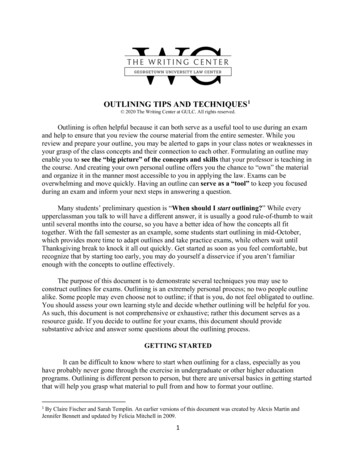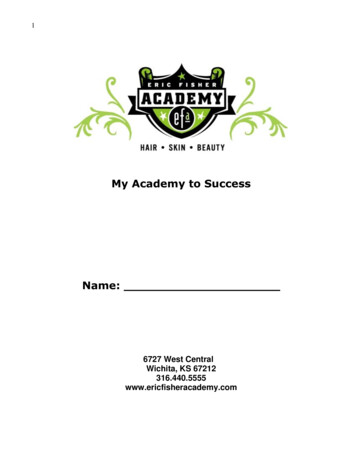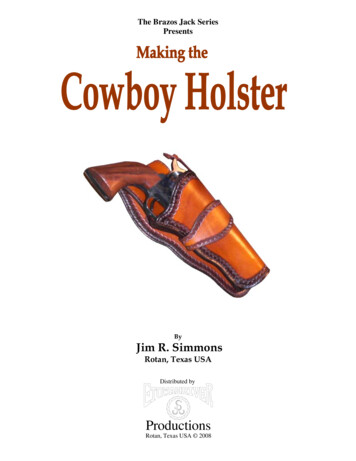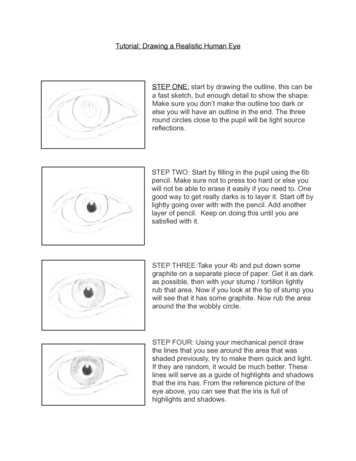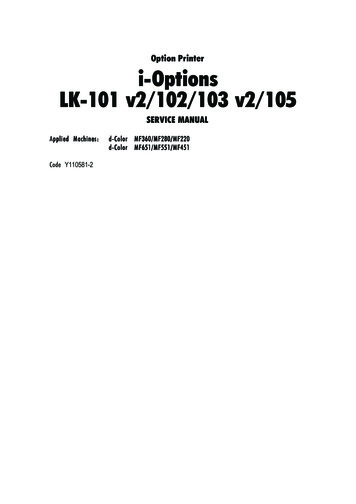
Transcription
Outline of the Book of MatthewIntroduction:Matthew 1:1 sets forth the theme of this study, “The book of the generation (birth) of Jesus Christ, the son ofDavid, the son of Abraham.” The caption in the American Standard Version Bible reads, “The Gospel:according to Matthew.” The word gospel is equated to “good news.” Jesus represents good news because Hecame into the world to save sinners from the condemnation of sin (Matt. 1:21). The apostle Paul writes,“Faithful in the saying, and worthy of all acceptation, that Christ Jesus came into the world to save sinners; ofwhom I am chief:” (I Tim. 1:15). The apostle John writes, “For the law was given through Moses; grace andtruth came through Jesus Christ” (Jn. 1:17). Grace is identified in the New Testament as the forgiveness of sins(cf. Eph. 1:7; Rom. 5:1-2). Paul tells the Romans, “being justified freely by his grace through the redemptionthat is in Christ Jesus:” (Rom. 3:24). Man’s eternal existence in heaven is contingent upon whether or notforgiveness is obtained. Considering the magnitude of the subject of grace and forgiveness it is entirelyappropriate that “accounts” of the life of the one responsible for such attainment be given utmost attention.The Author:The caption records Matthew as the individual giving the “account” of the gospel message. Matthew was atax collector (“publican”) before his conversion (cf. Matt. 9:9). Matthew is referred to as “Levi the son ofAlphaeus” at Mark 2:14. Interestingly, as an apostle of Jesus Christ, he is not mentioned again in the NT afterthe events of Pentecost (Acts 2). In fact, outside of the gospels his name is only mentioned at Acts 1:13.Date of Matthew:Other than Matthew making mention of the coming destruction of Jerusalem there is no other real evidencesof time. History reveals Titus to march on Jerusalem at 70 AD. It appears that Matthew speaks propheticwords regarding this as an event to come in the future (cf. Matt. 24:2ff). If we consider that Jesus was crucifiedat approximately 35 AD we can safely say that the book of Matthew was written sometime between 35 and 70AD.Contents of BookThe book of Matthew records the rise of Christ to popularity, his death by crucifixion, his resurrection andglorification. Jesus arose to popularity among the Jews from the region of Galilee. Jesus maintained hispopularity during the early, middle, and latter stages of the Lord’s short preaching time. Multitudes of peopleliterally mangled upon one another for an opportunity to see or touch Jesus (see Lk. 5:1). The more signs theLord performed the greater his following (cf. Jn. 2:23). Matthew depicts this rise to popularity in the midst of agreat struggle against the Jewish councilmen (i.e., the chief priests, elders, Pharisees, and Sadducees). Jesuswould never let any man or council stand in the way of a soul’s salvation. Matthew records the Lord’s publicexposure of these Jewish unbelievers (cf. Matt. 5:20; 7:15ff; 16:11-12; 23:1-4, 33). The public exposure of theJewish leaders’ error eventually would lead to the death of Christ upon the cross (see Matt. 15:12). Jesus knewthat this would occur (cf. Matt. 26:61). The time was thereby short for Jesus. He spent his time teaching andexercising compassion upon the people so that they might believe (cf. Jn. 20:30). Jesus’ message was the“gospel of the kingdom” (Matt. 4:23). Matthew spends a considerable amount of time identifying what thekingdom of God is and who would have entrance into it. The book as a whole is a letter that depicts thevictorious life of Christ over sin and death. Matthew is a book that encourages Christians today to walk andhope in Christ.1
Chronology and Geography of Jesus: Jesus was born in Bethlehem Judea (Matt. 2:1).Joseph and Mary take Jesus to Egypt to escape the wrath of Herod (Matt. 2:13).Joseph and Mary come back to Judea after the death of Herod and are then instructed to flee to Nazareth ofGalilee (Matt. 2:19-23).Jesus spends his first thirty years in Nazareth (Lk. 3:23) and then travels to the Jordan River to be baptizedby John the baptizer (Matt. 3:13) near Bethany (cf. Jn 1:28).Due to John the baptizer being “delivered up” Jesus withdraws from the Jordan River to Galilee (Matt.4:12). The Lord comes to Cana and performs His first miracle (Jn. 2:1ff).Jesus leaves Cana and travels southward to Nazareth. The Lord taught in the synagogue the gospel of thekingdom (cf. Lk. 4:16ff).Jesus travels from Nazareth to Capernaum (Matt. 4:13; Lk. 4:31). While around the Capernaum and Sea ofGalilee area the Lord delivers the Sermon on the Mount (Matt. 5-7).Jesus travels to the country of the Gadarenes (Matt. 8:28).Jesus travels back across the Sea of Galilee to Capernaum (Matt. 9:1 – 13:53).Jesus travels to Nazareth (Matt. 13:54).Jesus leaves Nazareth for the desert after hearing of John’s death (Matt. 14:13-14).Jesus travels back to the Sea of Galilee and then to Gennesaret (Matt. 14:35-36).Jesus travels to Magadan (Matt. 15:39).Jesus travels North to Caesarea Philippi (Matt. 16:13).Jesus travels back to Galilee (Matt. 17:22).Jesus leaves Galilee and travels to Judea near the Jordan (Matt. 19:1).Jesus comes to Jericho (Matt. 20:29)Jesus travels to Jerusalem (Matt. 21:1)Jesus Christ is the fulfillment of OT Prophecies:Matthew records over sixty quotations from the OT (more than twice the amount found in the other gospelaccounts). Some thereby refer to Matthew as the apostle of fulfillment. Matthew quotes from twelve differentOT scriptures with the uniform formula, “This happened to fulfill what was spoken by the prophet ” Jesuswas the fulfilled promise of God to Abraham and David regarding their seed blessing all nations (cf. Matt. 1:1,21). Jesus came into the world at a time when the Mosaic system was being observed. The Lord taught perfectobedience to the Mosaic Law while teaching the gospel of the kingdom (Matt. 4:17, 23). Jesus was revealingtruths that would soon override the Mosaic system (Matt. 5:17ff). Matthew presents Jesus as the fulfillment ofthe OT promises of salvation. Here are the prophecies to prove this: Genealogies prove Jesus to be the Christ (cf. Matt. 1:1-14). Jesus was born of a virgin (Matt. 1:23 / Isa. 7:14). Jesus was born of Bethlehem of Judea (Matt. 2:6 / Mic. 5:2). Was called out of Egypt (Matt. 2:15 / Hosea 11:1). Attempt to kill the Messiah at birth caused great mourning (Matt. 2:17-18 / Jer. 31:15). Jesus was called a Nazarene (Matt. 2:23 / Isa. 11:1). Jesus was to have His way prepared by “the voice calling in the wilderness” (i.e. John the baptizer)(Matt. 3:3 / Isa. 11:3). Jesus preaches the light of the gospel message to those in Galilee and so fulfills Isaiah’s prophecy at Isa.9:1-2 (cf. Matt. 4:14-16). Luke 4:21 / Jesus fulfills the Isaiah 61:1ff passage (Jesus foretold as one who would preach the gospel,release man from the bondage of sin, and heal the sick). Jesus came to fulfill the law and prophets (Matt. 5:17).2
Jesus fulfills Isaiah 53:4 by taking the sickness of the world and healing them (cf. Matt. 8:17).Matthew revealed that John the Baptizer was also part of the fulfillment of OT prophecies that had to dowith Jesus (cf. Matt. 11:10 / Malachi 3:1).Jesus fulfills Isaiah 42:1ff in that his law would be universal (i.e., benefit Jew and Gentile)(cf. Matt. 12:18-21).Jesus fulfills the prophecy of Psalms 78:2 in that he came to this world and communicated to the people inparables.Jesus fulfills the prophecy of Isaiah 67:11 and Zechariah 9:9 in that he rides as a meek king into the city ofJerusalem on a donkey (cf. Matt. 21:4-5).Jesus fulfills the scriptures by dying to provide the world with the opportunity to be forgiven of sins (cf. Isa.53 and Jer. 31:31 and Matt. 26:54-56).The thirty pieces of silver that Jesus was sold for (Matthew states that a Jeremiah prophecy is here fulfilled;however, no such passage is found in Jeremiah / cf. Matt. 27:9-10).Gambling over the Lord’s clothing (Psalms 22:18 / Matt. 27:35).Numbered as a transgressor (Isa. 53:12 / Matt. 27:38).The Kingdom of God (Heaven) in Matthew:The terms “Kingdom of God” and “Kingdom of Heaven” are used interchangeably throughout the book ofMatthew to mean the same thing (cf. Matt. 19:23-24; Mk. 1:15 comp. to Matt. 3:17). Matthew refers to theKingdom of God (heaven) more than any of the other gospel accounts (three times as much as is found in thebook of Mark).Jesus is king of God’s KingdomThe Old Testament prophets foretold of God establishing David’s throne as an eternal kingdom (cf. II Sam.7:12-13). The government of God’s eternal kingdom would rest upon the shoulders of the “Mighty God” and itwas to uphold “justice and righteousness” (cf. Isa. 9:6-7). Luke plainly tells us that Jesus is the son of Davidthat was to reign as king on his father’s throne (Lk. 1:30-33). The king of God’s kingdom is further identifiedas Jesus by Zechariah’s prophecy regarding the Lord being “lowly and riding upon an ass” (Zech. 9:9).Matthew 21:4-5 records the fulfillment of Zechariah’s prophecy as Jesus makes his triumphal entry intoJerusalem. The multitude of witnesses in Jerusalem who saw the Lord on the donkey recognized these OldTestament prophecies and thereby shouted, “Hosanna to the son of David: Blessed is he that comes in the nameof the Lord; Hosanna in the highest” (Matt. 21:9). Furthermore, the prophet Daniel referred to the king ofGod’s eternal kingdom as the “son of man” (Dan. 7:13-14). Jesus applied the phrase, “Son of man” to himselfat Matthew 8:20 and 29 other times in the book of Matthew. Jesus indeed fulfilled all scriptures relating to theking reigning in God’s kingdom. The Lord came into the world during the days of the Roman Empire and thusfulfilled even the time frame (Dan. 2:44; Lk. 3:1-2). The king of God’s kingdom is Jesus (Col. 1:13).The Establishment of the Kingdom of GodMatthew records the coming of the kingdom of God to be the primary message of Jesus (cf. Matt. 4:17).Jesus taught His disciples the importance of teaching about the kingdom of God too (Matt. 6:9; 10:7). Jesusspoke of the nearness of the kingdom when he said that many currently alive would see its establishment (Matt.16:28; Mk. 9:1). The Old Testament prophets foretold of God’s kingdom being established in the “latter days”(Isa. 2:2-3; Dan. 2:28). These “latter days” would be a time of Roman rule (Dan. 2:43-45; 11:38-40). Thegeographic location of Jerusalem is given as the kingdom’s starting place (Isa. 2:2-3). God’s law was to goforth from the city of Jerusalem when His kingdom was established (Isa. 2:2ff; Lk. 24:46-49). Furthermore, theword of God tells us that the kingdom would be established with great power (Mk. 9:1; Lk. 24:49).3
When one turns to the New Testament we find the Roman Empire reigning supreme on the earth (Lk. 3:1-2;Acts 18:1-2). After Jesus was resurrected he appeared to the apostles and commanded them to tarry in the cityof Jerusalem until they be clothed with power to preach “repentance and remission of sins” (Lk. 24:46-49). Theday of Pentecost came fifty days after Jesus was crucified. The apostles were tarrying in the city of Jerusalemjust as the Lord had instructed them to. Acts 2 records the miraculous power of the Holy Spirit coming uponthe apostles just as Jesus had said it would. Peter stands before the multitude and preaches the first gospelsermon (the law going forth from Jerusalem) (see Acts 2:1-5, 21, 37-39). These events add up to theestablishment of the kingdom of God on the day of Pentecost after the Lord’s crucifixion just as the prophetshad foretold.Identity (what is the kingdom)To successfully trace the establishment of God’s kingdom to Acts 2 is to identify it as the church of JesusChrist. The word “church” is first used at Acts 5:11 in relation to the baptized believers in the kingdom of God.Luke records at Acts 4:4, “But many of them that heard the word believed: and the number of the men came tobe about five thousand.” Recall that at Acts 2:41 there were about “three thousand.” After the word church isused in relation to the kingdom of God at Acts 5:11 Luke writes, “and believers were the more added to theLord, multitudes both of men and women.” (Acts 5:14). This growing number of believers, who had beencalled into God’s kingdom by the gospel message, are referred to as “disciples” at Acts 6:1. Further proof ofthe church and God’s kingdom being terms that are interchangeably used in the scriptures may be found atMatthew 16:16-18 and II Thessalonians 1:4-5. God’s kingdom will always exist. After the Lord comes tojudge the world and take his saints to glory, the kingdom will be handed over to God and will continue foreternity (I Cor. 15:24ff).The church is comprised of people, and always will be. Said people are prepared at all times throughmeditation, prayer, and spiritual interest (cf. Matt. 25:1ff). God has a wonderful heavenly place prepared forthese prepared people (Matt. 21:33ff). God’s kingdom is different than all other kingdoms because it is spiritualin nature (Matt. 22:15-22; Jn. 18:36) and endless in its boundaries (Matt. 13:31). The kingdom of Godcontinues its growth as the gospel changes the hearts of sinners (Matt. 13:33).Who is in the kingdom?Peter said that those who hear, believe, repent, and are baptized enter into the kingdom of God (Acts 2:3842). Said people are forgiven of their sins through the blood of Jesus Christ (see Col. 1:20) and comprise a“kingdom and priests” (Rev. 5:9-10). Peter said that God “calls” men according to His “promise” into thiskingdom (Acts 2:39). The apostle Paul said that God’s call comes through the gospel message (II Thess. 2:1314). People are added to the kingdom of God as they answer the call of the gospel to change their sinful style oflife and be baptized for the forgiveness of those sins (I Thess. 2:12).The Peculiarity of the citizens of the Kingdom of GodThe book of Matthew has much to say about the identity of the kingdom of God. Throughout the book,Matthew “likens” the kingdom to various associations. When Jesus preached the Sermon on the Mount herevealed God’s kingdom people to be poor in spirit (Matt. 5:3), persecuted for righteousness sake (Matt.5:10ff.), and those who keep the commandments of God (Matt. 5:19-20; 7:21). The peculiarities of citizens ofGod’s kingdom continued to be revealed by Matthew as those interested in spiritual matters (i.e., the eternity ofthe soul) (Matt. 13:11-12) and able to distinguish between things spiritually healthy and unhealthy (Matt. 13:2430, 36-43). Citizens of the kingdom of God view their future spiritual well being as the greatest treasure thatone may obtain (Matt. 13:44). Church people realize that to trust in this world’s riches is to be an eternal failure(Mk. 10:24). These peculiar people see immeasurable value to God’s kingdom (Matt. 13:45-46) and so theyhumbly submit to all of God’s commands (Matt. 13:47ff; 18:1-4; 19:14-15). Kingdom people are different thanthose of the world in that they exercise mercy, compassion, patience, and kindness toward others (Matt. 18:23-4
35). Church people understand duty and are thereby loyal and obedient to God (cf. Matt. 25:14ff). The citizenof God’s kingdom is different than the world (i.e., sanctified) in that their interest, goals, language, actions, anddirection of life are governed by the word of God. Are you a citizen in the kingdom of God (cf. Eph. 2:19ff)?------------------------Matthew’s teaching on Discipleship:The word “disciple” occurs 73 times in the book of Matthew (far more than the other three accounts of thelife of Christ). Matthew terms the disciples “sons of God” at 5:9 and 5:45 just as the apostle Paul does (cf.Rom. 8:19; Gal. 3:26; Phil. 2:15). Matthew, speaking by inspiration, demands a life of lawful or righteousliving as delivered by Jesus (cf. Matt. 5:20, 48; 6:1, 33; 7:21; 12:50; 21:31).Matthew conjoins a righteous disposition with self-denial (Matt. 10:38ff; 16:24-26), suffering of persecution(Matt. 5:10-12; 10:16-25; 24:9-13), humility (Matt. 18:1-6; 20:26f; 23:11ff), and being childlike in innocenceand subjection to the heavenly Father as a child is to their parents (cf. Matt. 18:1-4). Disciples are made by theact of baptism (Matt. 28:18-20).The Character of Jesus (Every act of Jesus defines the word due to the fact that He is God): Compassionate (Matt. 9:36; 14:14; 15:32; 20:31-34).Wise (Matt. 13:54)Angered (Mk. 3:5-6).Blunt at times (Matt. 12:34; 15:7, 12; 16:23; 17:17; 23:33)Teacher (Jn. 3:2).Warned of false teaching (Matt. 16:11-12)Astonished people with His distinctive and authoritative preaching (Matt. 7:28; 9:2-8; 13:54).Demanding (Matt. 10:34-37; 12:33)Sharply criticized those who saw his miracles and heard his words yet continued in unbelief (Matt. 11:20).His miracles caused people to be amazed (Matt. 12:23).Righteous indignation against hard hearts (cf. Mk. 3:5ff).Did not tolerate damnable doctrines and precepts of men (Matt. 15:1-9; 16:11-12).Jesus is the “Son of Man” (Dan. 7:13; Matt. 8:20; 16:13).Jesus is the Christ, the Son of the living God (Matt. 16:16).Pure and Holy (Matt. 17:1-2).Merciful (Matt. 14:30-31; 17:7, 14).Confrontational (Matt. 21:12-17)Jesus illustrated a spirit that had no fear or favor of men (cf. Matt. 16:13ff; 22:16ff; 22:29-30).The Authority of Jesus Over the Devil (Matt. 4:10).Over sickness, diseases, demons, epileptic, and palsied (Matt. 4:24).Palsy (Matt. 8:5-10).Over Peter’s mother-in-law’s fever (Matt. 8:14-15)Demons (Matt. 8:16-17).Jesus exercises authority over the wind and sea (physical elements) (Matt. 8:23-27)Over demons and swine (Matt. 8:30-32).Over sin (Matt. 9:2-8).5
Over Matthew (Matt. 9:9)Over life and death (Matt. 9:23-25)Eyesight (Matt. 9:27-29)Over gravity and water (physical elements) (Matt. 14:24-25)Over fish of the sea (Matt. 17:27).Over a fig tree (Matt. 21:20).A Struggle for the Souls of MenAs one studies the life of Christ a foe immerges from the shadows of humanity. The scribes, Pharisees,Sadducees, chief priests, and elders (i.e., the Jewish Sanhedrin Council) were opposed to the Lord from thebeginning of his ministry and Jesus knew it (see Matt. 5:20). These men loved the praise of others and Jesustook this from them (cf. Matt. 21:15-16; Jn. 12:43). Like two modern day politicians who vie for the popularvote of humanity so Jesus and the Jewish council members seemed to be in such a race. The victor of this racewould not receive a government office but rather the souls of men. Jesus said that the Pharisees and Jewishcouncil members, “compass sea and land to make one proselyte, and when he is made, ye make him twofoldmore the child of hell than yourselves” (Matt. 23:15).The Lord’s PopularityJesus’ popularity was gained due to his exercising authority over the physical elements of the earth (Matt.8:23-27; 14:24-25; 17:27; 21:20), sickness and disease (Matt. 4:24; 8:5ff; 9:27-29), the devil (Matt. 4:10),demons (Matt. 8:16-17), life and death (Matt. 9:23-25), and even sin (Matt. 9:2-8). These miraculous actscaused the multitudes to follow him from many regions around Palestine (cf. Matt. 4:24-25). When followingthe life of Christ one notes the fame (Matt. 9:26, 31) the Lord gained as he astonished the multitudes with hispreaching and miracles (Matt. 9:33; 12:23; 22:33). As word of Jesus’ miracles and preaching went abroadpeople were motivated to travel great distances to hear and see him (Matt. 13:1ff). Every where the Lord wentthe multitudes followed him hoping to be healed, fed, and to hear him preach (Matt. 14:13-14). After themultitude witnessed Jesus’ miracles they proclaimed him deity; i.e., the longed for Messiah (Matt. 14:17-21compared to Jn. 6:14). The multitudes continue to follow Jesus every where he goes (i.e., to Galilee / Matt.15:29ff; to the mount of transfiguration / Matt. 17:14; Lk. 9:43; to Judea near the Jordan / Matt. 19:1 and up tohis final entrance into Jerusalem).When Jesus entered into the city of Jerusalem, during the last week of his life, the throngs of people publiclyproclaim their faith in His deity saying, “Hosanna to the son of David: Blessed is he that comes in the name ofthe Lord; Hosanna in the highest.” (Matt. 21:9). Even as far as two days before Jesus is killed on the cross hispopularity remained in tact (cf. Matt. 26:1-5). A sharp decline in the Lord’s popularity among the Jews occurs;however, from Matthew 26:5 and 26:47. Within a few hour time frame the multitudes’ hearts were turned fromconfessing his deity to demanding Jesus’ death. What happened? What caused a change of heart among themultitudes? The answer to this question appears to be found at Matthew 27:20, “-ow the chief priests and theelders persuaded the multitudes that they should ask for Barabbas, and destroy Jesus.” The powerful andpersuasive speech of the Jews was contagiously accepted. Jesus was apprehended as a common criminal (Matt.26:47ff). The Lord was then taken to Caiaphas for trial and further persuasion by the council. The high priestssaid to Jesus, “I adjure thee by the living God, that thou tell us whether thou art the Christ, the Son of God”(26:63). The silence of Jesus only annoyed Caiaphas. The high priest forces Jesus to speak in an attempt toincite the crowd to his level of anger and seems to have succeeded. Here is the true matter as to their arrest andgathering against Jesus this night. His claims to be the Christ prophesied of in the OT was unacceptable to thehigh priest, elders, and chief priests. The Lord’s miracles and good standing with the people displeased them(cf. Matt. 21:15). His stern rebukes against their wayward lives affronted them (Matt. 21:45-46). They werealtogether offended by Jesus (cf. Matt. 15:12). The pride of the high priest and Sanhedrin council is depictedhere. Those who disagreed with their manner of life, even if sinful, would not be tolerated. Like the prophets6
of old who exposed the people’s sins were killed even so would it be with the Christ (cf. I Kings 19:10; Amos2:12; Isa. 30:10; Matt. 23:31; Acts 7:52; Rev. 18:24). The multitudes are now completely opposed to Jesus(Matt. 27:22ff).The Powerful and Leavening Effects of the Pharisees’ False Teaching (cf. Matt. 16:12-13)One may ask how people’s minds can change so quickly. The events of the final days of the life of Christought to teach us the danger of false teachers and the importance of exposing them. Jesus never tolerated theerror of the Jews. The Lord thereby warns his disciples and the multitudes to “beware of the leaven of thePharisees and Sadducees. Then understood they that he bade them not beware of the leaven of bread, but of theteaching of the Pharisees and Sadducees” (Matt. 16:11-12). The Pharisees saw Jesus as a challenge to theirauthority among the people. Their focus was to expose Jesus as one who opposed the Mosaic Law and falselyset himself forth as the Christ. The Jewish council members repeatedly challenge Jesus before the multitude inhopes of causing him to be rejected (Matt. 16:1; 19:3; 21:23; 22:25; 26:3). While the Pharisees tried to trip upJesus the Lord continued to pointedly expose them as wicked husbandmen (Matt. 21:33ff) and hypocrites (Matt.23 all). Interestingly, even the Pharisees marveled at the answers Jesus gave them to their deviant questions (cf.Matt. 22:22). Many today seem to want to protect false teachers rather than exposing not only their doctrinesbut their person. Let all see from the life of Christ the dangers involved in letting false teachers work gounchallenged. It took only a matter of hours for the multitudes faith to be overthrown by the Jewish council.There is today, as in the days of Christ, a struggle for the souls of men.Outline of the Book of MatthewI.Matthew records the Genealogy of Christ to prove Him to be the promised Messiah of the OT(1:1-17):A. “The book of the generation of Jesus Christ, the son of David, the son of Abraham” (1:1).1. The ancestry of Jesus Christ, the son of God, is first examined by Matthew. Jesus is the longawaited Messiah that would save man from the consequences of their sins.2. Though God had hinted at a savior as early as Genesis 3:15 a clear promise is not revealed untilGenesis 12. Jesus would come from the seed of Abraham and bless all nations with theopportunity to receive the forgiveness of sins (cf. Gal. 3:8, 16).3. God’s purpose to forgive man of sin has always been (cf. Eph. 1:3ff). Said promise was madeto Abraham and latter to David (cf. II Sam. 7:12ff).B. “Abraham begat Isaac; and Isaac begat Jacob; and Jacob begat Judah and his brethren; andJudah begat Perez and Zerah of Tamar; and Perez begat Hezron; and Hezron begat Ram; and Rambegat Amminadab; and Amminadab begat -ahshon; and -ahshon begat Salmon; and Salmonbegat Boaz of Rahab; and Boaz begat Obed of Ruth; and Obed begat Jesse; and Jesse begat Davidthe king” (1:2-6).1. Fourteen generations of the ancestry of Jesus are given (i.e., from Abraham to David).2. Note that Jesus was of the tribe of Judah (cf. Heb. 7:14) of whom the promised Messiah was tocome (cf. Gen. 49:10).C. “And David begat Solomon of her that had been the wife of Uriah; and Solomon begat Rehoboam;and Rehoboam begat Abijah; and Abijah begat Asa; and Asa begat Jehoshaphat; and Jehoshaphatbegat Joram; and Joram begat Uzziah; and Uzziah begat Jotham; and Jotham begat Ahaz; andAhaz begat Hezekiah, and Hezekiah begat Manasseh; and Manasseh begat Amon; and Amon begatJosiah; and Josiah begat Jechoniah and his brethren, at the time of the carrying away to Babylon”(1:7-11).1. Once again there are fourteen generations given between David and the carrying away intoBabylonian Captivity.7
II.2. Note that three kings (generations) are omitted (i.e., those between Joram and Uziah [Ahaziah,Joash, Amaziah]). Matthew may have deleted these names due to their close relationship toAhab and Jezebel.D. “And after the carrying away to Babylon, Jechoniah begat Shealtiel; and Shealtiel begatZerubbabel; and Zerubbabel begat Abiud; and Abiud begat Eliakim; and Eliakim begat Azor; andAzor begat Sadoc; and Sadoc begat Achim; and Achim begat Eliud; and Eliud begat Eleazar; andEleazar begat Matthan; and Matthan begat Jacob; and Jacob begot Joseph the husband of Mary,of whom was born Jesus, who is called Christ” (1:12-16).1. Jechoniah was the king at the time of Babylon’s invasion and taking away of the people ofJudah.2. Note that Matthew changes the course of writing when it comes to the birth of Jesus. Ratherthan saying that Joseph and Marry “begat” Jesus He proclaims, “of whom was born Jesus.”This may be Matthew’s way of illustrating a miraculous birth.3. Jesus is called the “Christ.” The English / Greek equivalent of Messiah. Matthew brings hisreaders to an understanding of the fulfillment of prophecy regarding the Christ.E. “So all the generations from Abraham unto David are fourteen generations; and from David untothe carrying away to Babylon fourteen generations; and from the carrying away to Babylon untothe Christ fourteen generations” (1:17).1. The generations from Abraham to Christ, as listed by Matthew, divide up into threes.2. There is no apparent meaning behind the three divisions other than it being a possible memoryaid.A Record of Jesus’ Birth (1:18-25):A. “-ow the birth of Jesus Christ was on this wise: when his mother Mary had been betrothed toJoseph, before they came together she was found with child of the Holy Spirit” (1:18).1. To be “betrothed” (mnesteuo) “to woo, court, seek in marriage. to woo and win, espouse.to promise in marriage, betroth” (LS 516). Modern day engagements are very similar to theBible day’s betrothals. Matthew makes it very clear that Mary and Joseph are not married atthis point.2. Before Mary and Joseph were married “she was found with child of the Holy Spirit.” Luke tellsus that Gabriel had announced the birth of Jesus to Mary while she was in Galilee (cf. Lk. 1:2632). Mary was a bit confused as to how this would happen “seeing I know not a man” (Lk.1:34). The answer Gabriel gives is recorded at Luke 1:35, “The Holy Spirit shall come uponthee, and the power of the Most High shall overshadow thee: wherefore also the holy thingwhich is begotten shall be called the Son of God.” To “overshadow” (episkiazo) “to throw ashadow upon, overshadow” (LS 300), “to shade, to overshadow, met. To overshadow, to shedinfluence upon” (Moulton 160). By the power of God (His miraculous influence) Maryconceived a child and thereby fulfilled prophecy as mentioned in Matthew 1:23.B. “And Joseph her husband, being a righteous man, and not willing to make her a public example,was minded to put her away privily” (1:19).1. Note that Joseph is regarded by Matthew as Mary’s “husband” even though they have not beenofficially married. Clearly OT betrothal was equated to being married. Joseph “was minded toput her away privily.” To “put away” (apoluo) “to loose from, to set free from, release orrelieve from. to dismiss. to divorce a wife” (LS 102) (see study # 1; MDR).2. According to Mosaic Law, an adulterous wife was doomed to death (Deut. 22:23-24). Josephwas “righteous” and thereby knowledgeable of said law yet he too did not wish to make a“public example” of her. Joseph cared about Mary. Though her sin would have been againsthim and God he chose not to follow through with the death penalty. Apparently he had thechoice in the matter since the sin was against him.C. “But when he thought on these things, behold, an angel of the Lord appeared unto him in a dream,saying, Joseph, thou son of David, fear not to take unto thee Mary thy wife: for that which isconceived in her is of the Holy Spirit” (1:20).8
1. Here are the facts so far:a. A woman named Mary was in Galilee when the angel Gabriel announced unto her that shewould miraculously have a child that would take the throne of David as King of God’seternal kingdom (cf. Lk. 1:26ff).b. Gabriel explains that the Holy Spirit would “overshadow” her and thereby she wouldmiraculously conceive a m
The terms “ Kingdom of God ” and “ Kingdom of Heaven ” are used interchangeably throughout the book of Matthew to mean the same thing (cf. Matt. 19:23-24; Mk. 1:15 comp. to Matt. 3:17). Matthew refers to the Kingdom of God (heaven) more than any of the other gospel accounts (three times as much as is found in the book of Mark).






